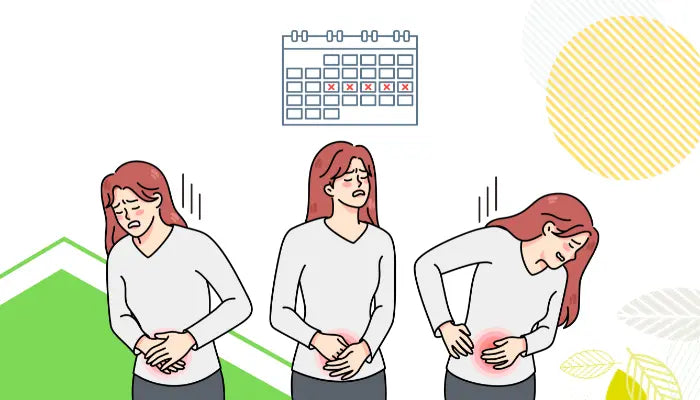Your Cart is Empty

অস্বাস্থ্যকর পিরিয়ড বলতে মাসিক চক্রকে বোঝায় যা অনিয়মিত, অত্যধিক ভারী বা দীর্ঘস্থায়ী, এর সাথে গুরুতর ক্র্যাম্প, বেদনাদায়ক মিলন, অস্বাভাবিক স্রাব, বা ক্লান্তি, ব্রণ এবং মেজাজ পরিবর্তনের মতো অন্যান্য লক্ষণ।
একটি অস্বাস্থ্যকর সময়কাল বিভিন্ন লক্ষণ দ্বারা চিহ্নিত করা যেতে পারে যা একটি অন্তর্নিহিত সমস্যা নির্দেশ করে। মাসিকের স্বাস্থ্য বজায় রাখার জন্য এই লক্ষণগুলি বোঝা অত্যন্ত গুরুত্বপূর্ণ।
অনিয়মিত মাসিক চক্র একটি অস্বাস্থ্যকর সময়ের লক্ষণ হতে পারে। এর মানে হল যে পিরিয়ডের মধ্যে সময় উল্লেখযোগ্যভাবে পরিবর্তিত হতে পারে, বা পিরিয়ডগুলি সম্পূর্ণ মিস হতে পারে। অনিয়মিত চক্র হরমোনের ভারসাম্যহীনতা, চাপ, ওজন পরিবর্তন, PCOS, থাইরয়েড রোগ এবং অন্যান্য অন্তর্নিহিত স্বাস্থ্য অবস্থার কারণে হতে পারে। আপনি যদি অনিয়মিত পিরিয়ড অনুভব করেন তবে ডাক্তারের পরামর্শ নেওয়া গুরুত্বপূর্ণ।

পিরিয়ডের সময় ভারী বা দীর্ঘ রক্তপাত একটি অস্বাস্থ্যকর সময়ের লক্ষণ হতে পারে। এর মানে হল যে রক্তপাত সাত দিনের বেশি হতে পারে, বা প্রতি ঘণ্টায় ট্যাম্পন বা প্যাড দিয়ে কয়েক ঘন্টা ভিজিয়ে রাখতে পারে। হরমোনের ভারসাম্যহীনতা, ফাইব্রয়েড, এন্ডোমেট্রিওসিস বা অন্যান্য অন্তর্নিহিত স্বাস্থ্যের কারণে ভারী বা দীর্ঘায়িত রক্তপাত হতে পারে। আপনি যদি ভারী বা দীর্ঘায়িত রক্তপাত অনুভব করেন তবে চিকিত্সার মনোযোগ প্রয়োজন।
পিরিয়ডের সময় গুরুতর ক্র্যাম্প একটি অস্বাস্থ্যকর সময়ের লক্ষণ হতে পারে। এর মানে হল যে ক্র্যাম্পগুলি দৈনন্দিন কাজকর্মে হস্তক্ষেপ করার জন্য যথেষ্ট গুরুতর এবং ওভার-দ্য কাউন্টার ব্যথার ওষুধ দিয়ে উপশম নাও হতে পারে। হরমোনের ভারসাম্যহীনতা, এন্ডোমেট্রিওসিস বা অন্যান্য অন্তর্নিহিত স্বাস্থ্যের অবস্থার কারণে গুরুতর ক্র্যাম্প হতে পারে। আপনি যদি পিরিয়ডের সময় গুরুতর ক্র্যাম্প অনুভব করেন তবে ডাক্তারের পরামর্শ নেওয়া গুরুত্বপূর্ণ।

বেদনাদায়ক সহবাসও একটি অস্বাস্থ্যকর সময়ের লক্ষণ। এর মানে হল যে মিলন বেদনাদায়ক এবং তলপেটে বা পেলভিক অঞ্চলে অস্বস্তি বা ব্যথা হতে পারে। বেদনাদায়ক মিলন এন্ডোমেট্রিওসিস, পেলভিক প্রদাহজনিত রোগ বা যোনি সংক্রমণের মতো অবস্থার কারণে হতে পারে। আপনি যদি বেদনাদায়ক সহবাসের অভিজ্ঞতা পান তবে চিকিৎসা মনোযোগ প্রয়োজন।
মাসিকের সময় অস্বাভাবিক স্রাব একটি অস্বাস্থ্যকর সময়ের লক্ষণ হতে পারে। এর মানে হল যে স্রাব স্বাভাবিক ঋতুস্রাব প্রবাহ থেকে ভিন্ন, যেমন ঘন, গাঢ়, বা দুর্গন্ধযুক্ত। অস্বাভাবিক স্রাব সংক্রমণ বা অন্যান্য অন্তর্নিহিত স্বাস্থ্য অবস্থার কারণে হতে পারে। পিরিয়ডের সময় যদি আপনি অস্বাভাবিক স্রাব অনুভব করেন তবে ডাক্তারের পরামর্শ নেওয়া গুরুত্বপূর্ণ।
একটি অস্বাস্থ্যকর সময়ের অন্যান্য লক্ষণগুলির মধ্যে রয়েছে ক্লান্তি, ব্রণ, মেজাজ পরিবর্তন এবং অন্যান্য শারীরিক বা মানসিক লক্ষণ। এই লক্ষণগুলি হরমোনের ভারসাম্যহীনতা বা পলিসিস্টিক ওভারি সিন্ড্রোম (PCOS) এর মতো অন্তর্নিহিত স্বাস্থ্যের অবস্থার কারণে হতে পারে। আপনার মাসিক চক্রের সময় আপনি যদি এই উপসর্গগুলি অনুভব করেন তবে চিকিৎসা মনোযোগ প্রয়োজন।
চিকিত্সা না করা মাসিক সমস্যা একজন ব্যক্তির স্বাস্থ্য এবং সুস্থতার উপর গুরুতর পরিণতি ঘটাতে পারে। জটিলতা রোধ করতে এবং সামগ্রিক স্বাস্থ্যের উন্নতির জন্য মাসিকের যেকোন সমস্যার জন্য চিনতে ও চিকিৎসার পরামর্শ নেওয়া গুরুত্বপূর্ণ। মাসিকের চিকিৎসা না করায় কোন ধরনের সমস্যার সম্মুখীন হতে পারেন তা জেনে নিন।
রক্তাল্পতা চিকিত্সা না করা মাসিক সমস্যাগুলির সাথে যুক্ত একটি প্রধান ঝুঁকি। এটি ঘটতে পারে যখন একজন ব্যক্তি তাদের মাসিক চক্রের সময় ভারী বা দীর্ঘ রক্তক্ষরণ অনুভব করেন, যার ফলে শরীরে লোহিত রক্তকণিকা এবং হিমোগ্লোবিনের অভাব হয়। অ্যানিমিয়া ক্লান্তি, দুর্বলতা, শ্বাসকষ্ট এবং অন্যান্য জটিলতা সৃষ্টি করতে পারে, যা মাসিকের সমস্যাগুলির জন্য চিকিৎসার সাহায্য নেওয়াকে গুরুত্বপূর্ণ করে তোলে।

চিকিত্সা না করা মাসিক সমস্যা বন্ধ্যাত্ব হতে পারে। পলিসিস্টিক ডিম্বাশয় সিন্ড্রোম, এন্ডোমেট্রিওসিস এবং পেলভিক প্রদাহজনিত রোগ প্রজনন ব্যবস্থাকে ক্ষতিগ্রস্ত করতে পারে, যার ফলে গর্ভধারণ করা কঠিন হয়ে পড়ে। দীর্ঘমেয়াদী প্রজনন জটিলতা প্রতিরোধ করার জন্য মাসিকের সমস্যাগুলিকে প্রথম দিকে মোকাবেলা করা গুরুত্বপূর্ণ।
চিকিত্সা না করা মাসিক সমস্যাগুলি এন্ডোমেট্রিওসিস এবং পেলভিক ইনফ্ল্যামেটরি ডিজিজ (পিআইডি) সহ পেলভিক ইনফেকশন হতে পারে। এই অবস্থাগুলি দীর্ঘস্থায়ী ব্যথা, যৌনতার সময় অস্বস্তি এবং বন্ধ্যাত্বের কারণ হতে পারে।
চিকিত্সা না করা মাসিক সমস্যাগুলি দীর্ঘস্থায়ী ব্যথা, ভারী রক্তপাত এবং অন্যান্য উপসর্গগুলির সাথে মোকাবিলা করার শারীরিক এবং মানসিক চাপের কারণে উদ্বেগ এবং বিষণ্নতার মতো মানসিক স্বাস্থ্য সমস্যাও হতে পারে। আপনার মাসিক চক্রের সময় আপনি যদি কোনো লক্ষণ অনুভব করেন তবে চিকিৎসা সহায়তা নেওয়া গুরুত্বপূর্ণ।
চিকিত্সা না করা মাসিক সমস্যাগুলি কিছু ধরণের ক্যান্সারের ঝুঁকি বাড়াতে পারে, যেমন এন্ডোমেট্রিয়াল এবং ডিম্বাশয়ের ক্যান্সার। নিয়মিত মাসিক স্বাস্থ্য পরীক্ষা এবং যেকোনো অস্বাভাবিকতার সময়মত চিকিৎসা এই ক্যান্সারের ঝুঁকি কমাতে সাহায্য করতে পারে।
একটি অস্বাভাবিক পিরিয়ড বিবেচনা করা হয় যখন মাসিক চক্র 21 থেকে 35 দিনের স্বাভাবিক পরিসরের চেয়ে ছোট বা দীর্ঘ হয়, যখন খুব হালকা বা খুব বেশি রক্তপাত হয়, যখন মাসিকের মধ্যে দাগ থাকে, বা যখন মাসিকের সময় তীব্র ব্যথা এবং অস্বস্তি হয়। .
আপনার পিরিয়ড সম্পর্কে চিন্তা করা উচিত যদি আপনি নিম্নলিখিতগুলির মধ্যে কোনটি অনুভব করেন: অনিয়মিত চক্র, অত্যন্ত ভারী বা দীর্ঘস্থায়ী রক্তপাত, গুরুতর বাধা, বেদনাদায়ক সহবাস, অস্বাভাবিক স্রাব, বা অন্যান্য উপসর্গ যেমন ক্লান্তি, ব্রণ, মেজাজ পরিবর্তন ইত্যাদি। যদি আপনার উদ্বেগ থাকে। আপনার মাসিকের স্বাস্থ্য, আপনার স্বাস্থ্যসেবা প্রদানকারীর সাথে কথা বলা সর্বদা একটি ভাল ধারণা।
একটি স্বাস্থ্যকর সময়ের মধ্যে সাধারণত নিয়মিত চক্র, মাঝারি রক্তপাত যা 3-7 দিন স্থায়ী হয় এবং হালকা থেকে মাঝারি ক্র্যাম্পিং জড়িত থাকে যা ওভার-দ্য-কাউন্টার ব্যথা উপশম দিয়ে পরিচালনা করা যেতে পারে। আপনি যদি আপনার মাসিক চক্রের কোন লক্ষণ বা পরিবর্তন অনুভব করেন, তাহলে একজন স্বাস্থ্যসেবা প্রদানকারীর সাথে কথা বলা গুরুত্বপূর্ণ।
আরও পড়ুন: লিভার রোগের প্রধান কারণ কী? প্রতিরোধ এবং চিকিত্সা
মন্তব্য দেখানোর আগে অনুমোদিত হবে.